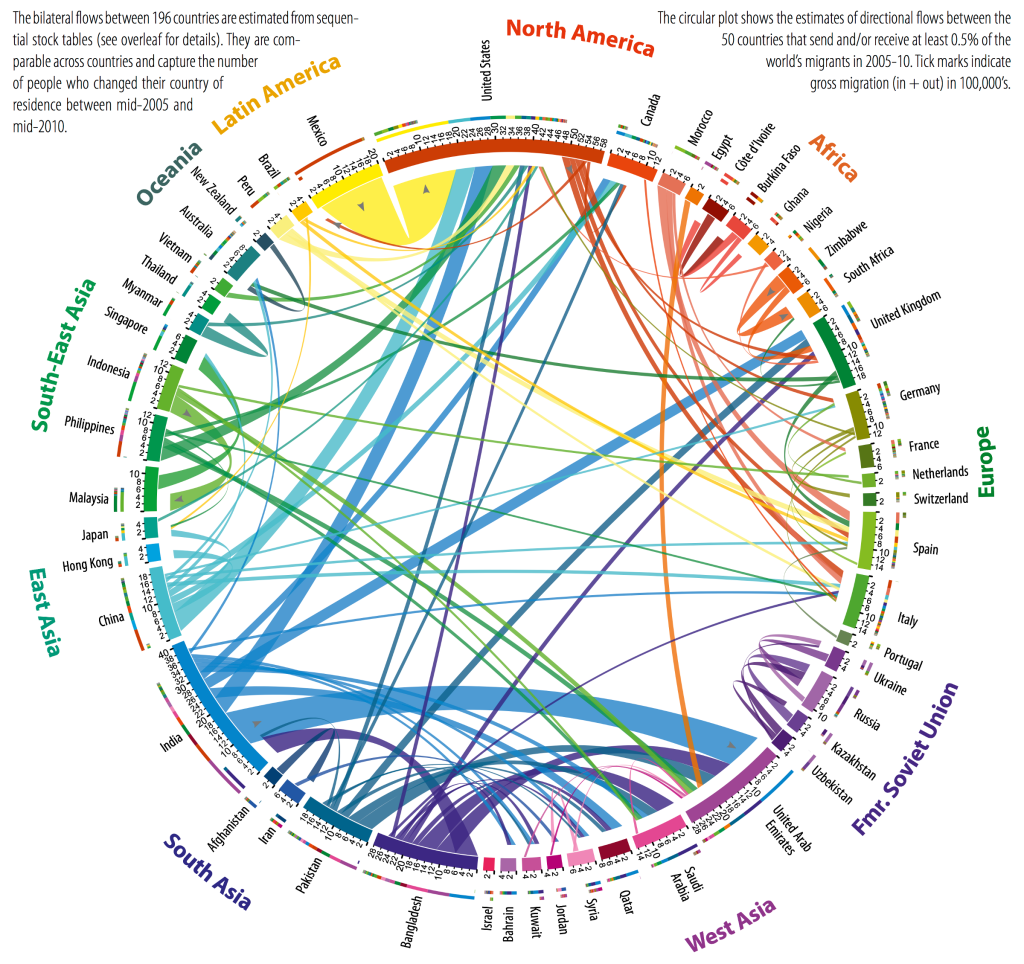Sarah Kendzior is an anthropologist and communications scholar who studies digital media and politics. Her home blog is at sarahkendzior.com.
Check out past posts from guest bloggers.
________________________________________________________________________
In the hallway of my anthropology department there was a map of the world. The map was covered with photos of students in the field, their exact location pinpointed by an image on a string. Every year, the academic coordinator would send out a call to students for a representative photo to add to the map, and every year, I failed to respond.
During the bulk of my dissertation fieldwork, I lived in Missouri. The people I wrote about, Uzbek exiled political dissidents, lived all around the world — in Sweden, Russia, Kyrgyzstan, Canada, the United States, Turkey. Having fled a brutal crackdown following a massacre of civilians, they lived lives of constant upheaval, on the move and on the run. They thought less about where they were than they did about Uzbekistan, the one place they could not go. They spent most of their time online, talking to each other and talking to me. I could not go to Uzbekistan either, since my previous articles criticized its authoritarian regime.

This picture shows the inside of the truck of the leader of the Birdamlik People’s Movement, an Uzbek opposition group. Birdamlik has branches in over a dozen countries (including Uzbekistan) but they are organized through the internet. The leader of the movement works in the US as a truck driver, and he calls this his “mobile office” — a communications center set up inside his 18-wheeler. The computer screen shows the Birdamlik website, which is banned in Uzbekistan. Pic by Sarah Kendzior (all rights reserved)
The online communities of exiled dissidents made for an interesting dissertation. But it posed a problem when it came to the department map. Should I mark every point on the map or none of them? Should I designate Uzbekistan somehow – a skull and crossbones, a circle with a slash? What was my “representative image” – an activist curled up with his laptop, updating his Facebook status? A blogger staring at Cyrillic on a screen? Me, alone at my desk, checking my email?
No one wants to see these things. No one wants to see visual documentation of their own online lives, much less the lives of others. It is the academic version of the tabloid reveal – “Uzbek dissidents – they’re just like us!” Such banality runs counter to anthropological advertising. The purpose of the department map was to show visitors that our research subjects are not just like us – but that we, for a time, could be just like them.
I was like the people I studied too, in that none of us have a place within the traditional conception of anthropological fieldwork. We were too much on the move, or we were not moving enough.
Journalism and Anthropology Face the Same Fate
Before I was an anthropologist, I was a journalist. The week I quit my job at the New York Daily News, another young journalist bowed out in a more dramatic fashion. In April 2003, Jayson Blair was fired from the New York Times for plagiarizing other articles, inventing quotes, and, most intriguingly, fabricating travel in order to merit the dateline that lends a Times piece its veracity. Instead of going to the places he was supposed to go and talking to the people who lived there, Blair would interview them on the phone from New York. Sometimes, he would fly into a city and “report” without leaving his hotel.
As the Blair scandal unfolded, it became known that the latter technique was occasionally practiced even by journalists who were not coke-addled liars. The dateline had its own value separate from the insight that the reporter was contributing. It was shorthand for the reporter’s personal involvement, his professional legitimacy, his deep, on-the-ground knowledge. Being there – regardless of what one was actually doing there – was enough, for this distinguished the journalist from the masses forced to rely on his words.
At the time I quit the Daily News, most print journalists viewed the internet with suspicion and disdain. In 2003, the version of the Daily News that appeared at their website was almost an exact replica of the edition that had been published that morning, save a “Breaking News” bar, reluctantly implemented in 2002, that linked to stories from wire services. Even 9/11 had prompted hand-wringing among the web staffers – dare they announce that the World Trade Center had collapsed and risk incurring the wrath of editorial?
Ten years later, such a scenario is unimaginable. The collapse of print journalism, and the attribution of its demise to the industry’s reluctance to adapt to the internet, has been thoroughly (and gleefully) eulogized by media and tech reporters, and was predicted years before it occurred. What few saw coming was how, in less than a decade, the internet would go from disreputable scourge to the dominant source of news and information, with reporters breathlessly parroting the Twitter feeds and Facebook statuses of famous people and ordinary citizens alike.
In 2003, I never thought CNN would film a website, but today this happens all the time, because well-placed internet users are now viewed as authorities due purely to their geographic proximity to an event. Facebook and Twitter users have become unwitting reporters (unpaid unwitting reporters), and media outlets rely on them. It is enough that they are there, updating from the scene, unlike the journalist whose travel budget was cut – never mind if the Twitter user knows from what he tweets.
A Discipline in Crisis
Today anthropology is facing a crisis of place, representation, and legitimacy similar to what journalism experienced a decade ago. Like journalists at the turn of the millennium, anthropologists have dealt with the challenges posed by the internet by ignoring them, downplaying the importance of the medium, and discounting its impact on the lives of the people they study. Despite the importance of the internet to people all over the world, there are few ethnographic studies of internet use conducted by anthropologists, and the anthropologists who do conduct this kind of research are marginalized and dismissed.
In a 2002 essay titled Another Revolution Missed, Maximillian Forte bemoaned the widespread refusal of anthropologists to acknowledge the web. “Why would anthropology, as a discipline, routinely ignore one particular field site?” he asked, noting that this field site is populated by “almost 600 million people of all ages, classes, nationalities, ethnic backgrounds, personal interests, and professions.”
While public acknowledgement of the internet as a medium worthy of anthropological inquiry has increased since the publication of Forte’s essay, there has been little in the way of ethnographic studies of how people are using it, save for a disproportionate focus on virtual worlds like Second Life. Anthropological research on the internet is rare compared to that of other disciplines, and the stigma of conducting it has remained.
In a 2012 interview with Fast Company, anthropologist Gabriella Coleman recalled how her dissertation research on hackers, conducted in the early 2000s, was viewed with bafflement by her professional peers. “My advisers knew it was super-interesting, but because it wasn’t focused on a particular area of the world, they warned me I was going to have trouble getting a job in an anthropology department,” she said.
Coleman is now a leading figure in the study of online communities, but that makes little difference to a discipline trading on exoticism and insularity. Even today, she says she is rarely invited to give talks in anthropology departments despite the fact that her research on Anonymous has captured the attention of the world.
On the Internet, No One Knows You’re an Anthropologist
That most anthropologists dismiss the internet as a subject worthy of ethnographic research is unfortunate but not surprising. As sociologist Christine Hine observes in Virtual Methods, “When we talk about methodology, we are implicitly talking about our identity and the standards by which we wish our work to be judged.” She notes that this is a particularly thorny issue for social scientists studying the internet, as “we threaten the security of a community of research practice.”
Anthropology of the internet challenges paradigms and practices that have been part of the discipline since its inception. The most notable methodological divergence concerns what many consider the hallmark of cultural anthropology: long-term ethnographic fieldwork.
In anthropology of the internet, there is no clear sense of a field site or of “time spent in the field”. (The researcher is either always in the field, or, naysayers claim, never in the field). The boundaries of the field site tend to be determined by the researcher, and its demarcations are often not clear even to the people he or she studies. Subject anonymity, another standard practice of anthropological research, is difficult to maintain with so much data public and traceable – and so much information fraudulent and fabricated. Anthropologists are left both fearful of exposing people and of having nothing “real” to expose.
There is also the question of who is doing the exposing. Much as the internet leveled the playing field between the reporter and the reader (often reversing their roles in the process), the internet has transformed the relationship between the social scientist and the subject, with the former no longer the lone recipient of the latter’s concerns. Not only does the “subaltern speak”, the “subaltern” shares the details of his life online in a way that anyone – not just anthropologists, anyone – can access.
The question then becomes what to do with this information. How do anthropologists connect online texts to the people who produce them? How do they judge whether their interpretations of an individual and a community are accurate? From where do anthropologists draw their authority and accountability?
Such questions are not new. Anthropologists who practice “traditional” fieldwork have been asking them for years. But like journalists of a decade ago, anthropologists are reluctant to address them in the context of online communication — in particular, to acknowledge how the internet has transformed the relationship between the writer and the people about whom he or she writes. The internet makes ethnography something anyone can do, a threatening prospect for a conservative discipline struggling to locate its relevance. It is easier to dismiss the internet as not worthy of inquiry at all.
Anthropology of the internet forces the question of whether being seen as an anthropologist is more important than doing meaningful ethnography. It strips the discipline of its elite trappings, requiring no excessive funding or dramatic upending of one’s life. What it does require is for the researcher to rely on more than just a dateline. When you are not going anywhere, you have to make the journey matter.






 Aaron Swartz was considered a “Robin Hood” type hero among many, involved in the open access movement, which advocates the free, unrestricted dissemination of information through the internet.(Noah Berger/Reuters)It’s nearly one week since the tragic death of Aaron Swartz, a digital pioneer and activist who
Aaron Swartz was considered a “Robin Hood” type hero among many, involved in the open access movement, which advocates the free, unrestricted dissemination of information through the internet.(Noah Berger/Reuters)It’s nearly one week since the tragic death of Aaron Swartz, a digital pioneer and activist who 